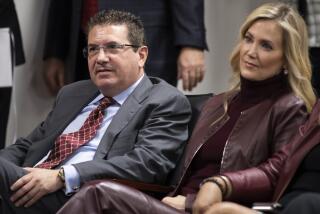White House Scored on Close Ties to Presser
- Share via
WASHINGTON — The President’s Commission on Organized Crime criticized the Reagan Administration Tuesday for its close political ties to Teamsters Union President Jackie Presser, saying that contacts between public officials and mob-linked union officials can erode public confidence and “dampen the desire to end racketeering.”
The commission, issuing its report on labor corruption, said that long delays in resolving the Justice Department’s investigation of Presser have sparked concern that Presser’s support of President Reagan in the 1980 and 1984 elections “influenced the conduct of the investigation.”
James D. Harmon Jr., the commission’s executive director, said that the Presser case represents “a dilemma posed for all public officials of integrity, and that is the extent to which legitimate concerns of union members can be addressed without public officials being associated with labor officials of unions controlled by organized crime.”
Top Administration officials have had repeated contacts with Presser even while he was under investigation in a Cleveland labor fraud case--most recently at a Dec. 17 farewell reception for Francis X. Lilly, formerly solicitor at the Labor Department, that was attended by White House officials.
Lilly, asked recently why Presser had attended the party, said he had known the Teamster leader from the 1980 campaign, when Lilly worked as an advance man for Reagan and Presser was the campaign’s only supporter among major labor leaders.
The commission said it had not conducted an investigation for any evidence of wrongdoing in the Justice Department’s Presser investigation but added that it “is convinced that the impact of such contacts can lead to an erosion of public confidence and dampen the desire to end racketeering.”
At a briefing for release of portions of the report, Harmon said that continued association of public and union officials “suggests that that kind of association is counterproductive to any effort designed to remove the influence of organized crime from labor unions, business and the mainstream of commerce.”
Issue of ‘Perception’
He said the issue is “one of simply perception” but refused to answer directly the question of whether Reagan had created an impression of impropriety by continuing to meet with Presser.
“This is not a phenomenon limited to this Administration,” Harmon said.
Among other illustrations of the problem, the report cited ties between public officials and Anthony Scotto, a former local and national officer of the International Longshoremen’s Assn. who was convicted of racketeering. Character witnesses at Scotto’s trial included then-New York Gov. Hugh L. Carey and former New York City Mayors John V. Lindsay, Abraham D. Beame and Robert Wagner, the report noted.
“Scotto’s power and relationships were so enduring that, even after his release from federal custody, numerous political figures joined him in a welcome-home dinner,” the commission said.
“When corrupt union leaders . . . are seen, in person or through the media, joining hands and breaking bread with the important political candidates and leaders of the country, these images convey a message to union members of the consequences of organized crime’s influence,” the report said. “They graphically demonstrate to the membership that political leaders are beholden to the person who dominates and controls their union.”
Investigating Investment
In a related development Tuesday, a Justice Department spokesman said the department is investigating Presser’s investment in a Cleveland theater that the commission described in a staff report as “highly suspect.”
Presser invested “a nominal sum” in Cleveland’s Front Row Theatre in 1974 and later estimated that the investment made him a millionaire.
More to Read
Get the L.A. Times Politics newsletter
Deeply reported insights into legislation, politics and policy from Sacramento, Washington and beyond. In your inbox twice per week.
You may occasionally receive promotional content from the Los Angeles Times.










